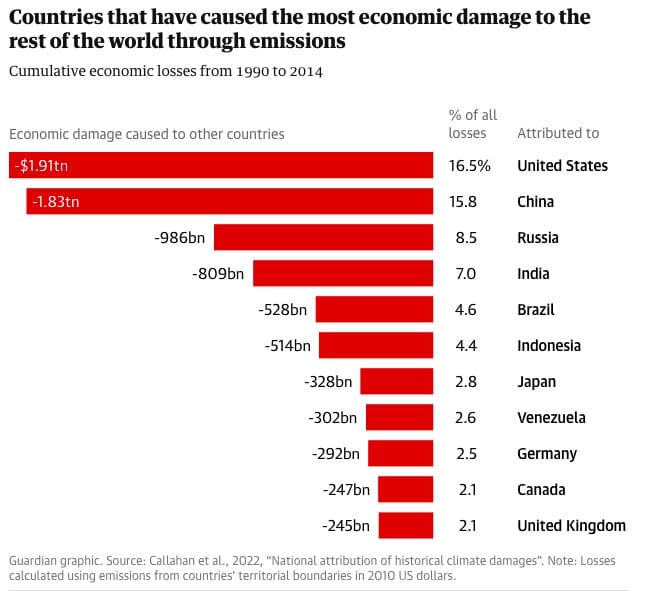Researchers at Dartmouth College found that the world’s top emitters have collectively caused US$6 trillion in income losses from warming from 1990 to 2014. US emissions have inflicted by far the biggest damage.
—
The US, China, Russia, Brazil, and India have collectively cost the world a staggering US$6 trillion between 1990 and 2014 – equivalent to about 11% of annual global GDP, a new analysis from Dartmouth College found. The world’s top 10 emitters – rounded out by Indonesia, Japan, Venezuela, Germany, and Canada – have collectively caused more than two-thirds of global financial losses.
The report, published in the journal Climatic Change on Tuesday, calculated climate damages caused by a single nations’ emissions among a sample of 143 countries for which data is available.
Researchers put the US ahead of China – currently the world’s largest emitting country – and the other big polluters in terms of financial damages that its emissions have caused to other nations since 1990. Climate change has caused major economic losses by damaging agricultural yields, reducing labor productivity and curbing industrial output.
Unsurprisingly, the study also revealed that poorer, warmer countries in the Global South – despite inflicting the least damage through emissions – suffered the greatest losses, providing the scientific basis for climate liability claims between individual countries and highlighting once again the immense inequity between developing nations and the Global North.
Countries like Mexico and the Philippines lost US$79.5 billion and $34 billion respectively from emissions generated by the US. Conversely, colder, richer nations like Russia and Canada gained $341 billion and $247 billion respectively, the study showed.
Such disparity can be explained by the fact that countries with cooler temperatures have benefitted from longer agricultural growing seasons and lower death rates as global warming contributed to a progressive rise in temperatures.

Image: Economic Damage Caused through Emissions by Country, 1990-2014
“The responsibility for the warming rests primarily with a handful of major emitters, and this warming has resulted in the enrichment of a few wealthy countries at the expense of the poorest people in the world.”, Dartmouth College assistant professor of geography and senior research author Justin Mankin said in a statement.
Climate liability has been a sticking point in climate talks. Less than a month ago, climate negotiators gathered in Germany for the first time since the Paris Agreement’s rulebook was brought to a close at COP26 in Glasgow. Despite the push for setting up a loss and damage financing facility that would force wealthier nations to compensate for the mounting losses, the issue was prevented from being added to the agenda for the upcoming COP27 climate conference in Sharm El-Sheikh, Egypt.
You might also like: Climate Finance: Are the Rich Nations Doing Enough?


















